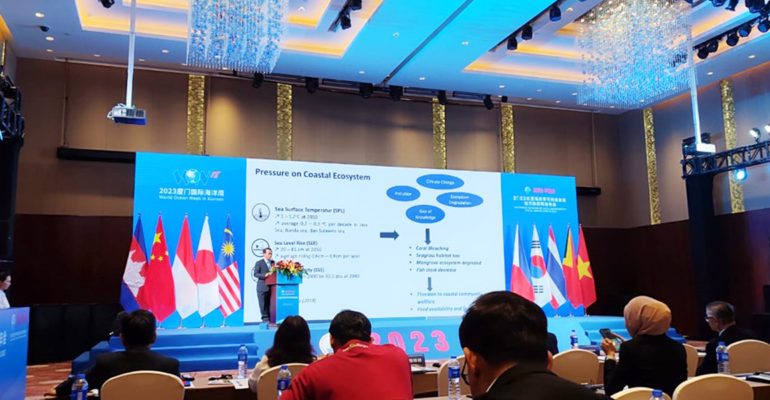Attending PNLG Forum, PKSPL IPB University Promotes Blue Carbon Capacity Development Program for East Asia

The Center for Coastal and Marine Resources Studies (PKSPL) of IPB University, which is trusted as the President of the PEMSEA Network Learning Center (PNLC), delivered concepts and proposals for research development and capacity building programs at the 2023 PEMSEA Network Local Government Annual Forum (PNLG Forum).
The PNLG Forum itself is an annual forum for local government networks that have marine areas in East Asian countries. A total of 56 local governments from 12 countries met to report the achievements of coastal management programs in their respective regions.
Chairman of PKSPL IPB University, Prof Yonvitner in his capacity as President of PNLC said, along with the global threat of climate change, coastal areas and small islands are the most vulnerable areas. For this reason, it is necessary to encourage mitigation and adaptation efforts from its impact.
“In the context of mitigation, PKSPL IPB University as a learning center for integrated coastal management initiated a solution program in reducing greenhouse gas (GHG) emissions, based on natural resources solutions through the development of blue carbon ecosystem mitigation,” he explained while attending the PNLG Forum at Xiamen Fujian Hotel, Xiamen City, Fujian Province, People’s Republic of China, (9-10/11).
In this case, he continued, PKSPL IPB University will encourage research schemes and capacity building programs. According to Prof Yonvitner, capacity building is needed. This is because the understanding and capacity of human resources in organizing the measurement, reporting and verification (MRV) system for GHG reduction, especially in the blue carbon ecosystem, is still very limited.
“Meanwhile, the international world and the government are encouraging blue carbon (mangroves and seagrasses) to become a very potential sector, a sector that can contribute to the achievement of nationally determined contribution (NDC) for each PEMSEA member country, including Indonesia,” he added.
Prof Yonvitner said, PKSPL IPB University as the Presidency of PNLC has an interest in mobilizing universities and research institutions in PEMSEA member countries in developing research and training. This step can undoubtedly help the government and East Asian countries in efforts to reduce GHG emissions as a cause of climate change.
“Climate change is increasingly burdening the community, especially coastal communities. With the proposal of PKSPL IPB University, it is hoped that coastal countries can strengthen mitigation and adaptation capacity so that coastal cities are more prepared and resilient in facing the impacts of climate change,” he said.
Prof Yonitner in his presentation also stated, “Why do we need to encourage the blue carbon ecosystem as a solution? Because the potential of blue carbon ecosystems, especially mangroves and seagrass, has the ability to store carbon and reduce emissions far better than other vegetation.”
Moreover, the blue carbon ecosystem is owned by all PEMSEA members. Although technically and methodologically, their knowledge and capacity in managing climate change mitigation efforts are still very limited. Including in terms of carbon trading. For Indonesia, for example, it has not been accommodated in the NDC and methodologically far behind the forest and others land use (FOLU) sector.
“For this reason, as the President of PNLC, PKSPL IPB University encourages this program to be jointly implemented in PEMSEA member countries through MRV training as a standard mechanism for reducing GHG emissions, especially from the marine sector,” concluded Prof Yonvitner. (MAA/Rz) (IAAS/RUM)



